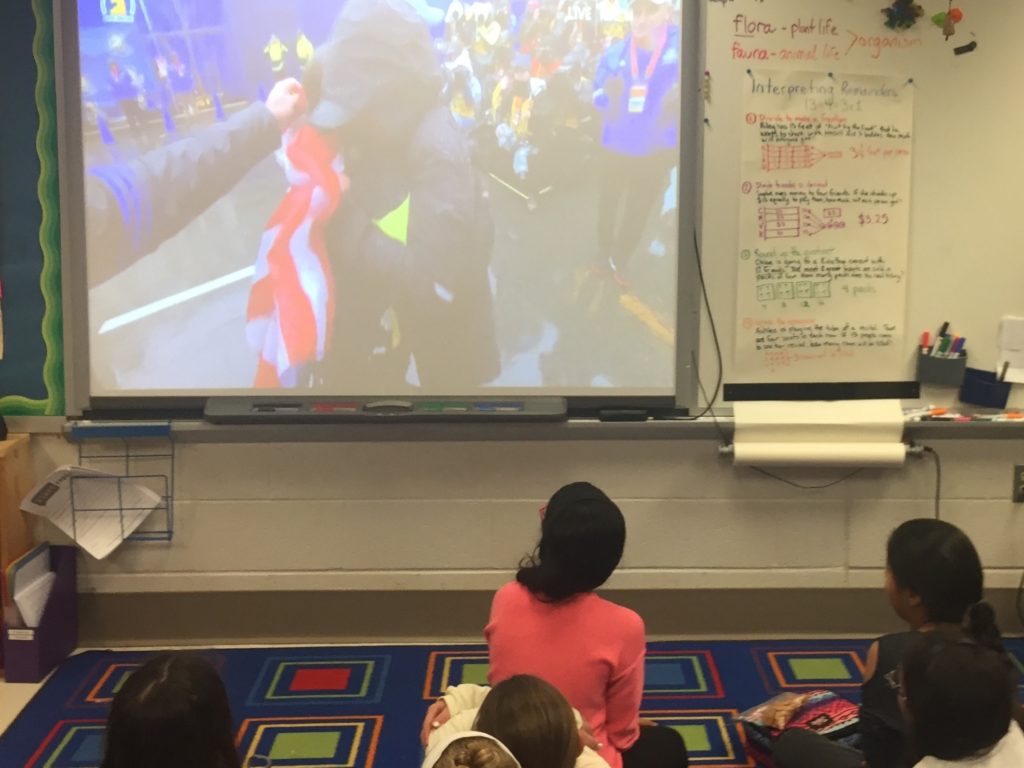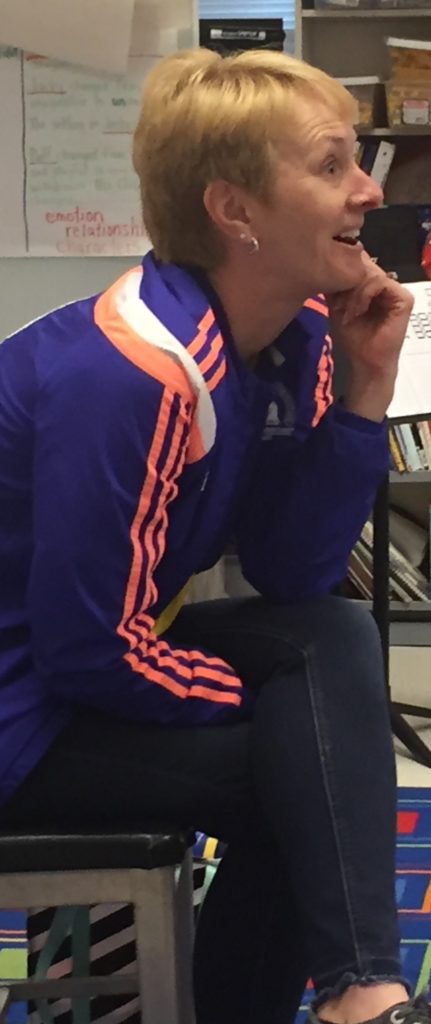Viewing: April, 2018
April 30, 2018
Poetry and Expository Writing
I’m really excited about our recent and upcoming units of study in ELA (English/Language Arts)! This week, we’re finishing up our poetry unit. Students have been learning about the different elements of poetry, including rhyme, meter, stanzas. We also looked at the kinds of figurative language used in poetry, focusing on similes, metaphors, idioms, and hyperbole, and also covering personification, onomatopoeia, and others. This week, we’re pulling it all together as we read and discuss different kinds of poetry and look at what we see in the poems, what we appreciate about them, etc. Students tend to have an initial sense of apathy for poetry, and we hope to change their views, even if only a little bit.
This week, we are also launching our study of expository writing. This is the form of writing that adults (and older kids) end up using most often. (Think about your daily life: How often do you write a story? Compare that to how often you find yourself writing an informational passage, such as an email about something for work, a letter to a friend about your vacation, or even a text message giving directions to a family member. Expository writing is a critical and often overlooked skill.) I love teaching this unit, because each year, I choose a different topic for us to launch this unit. Many years ago, we had a student in class whose dad was an Olympic swimmer! This inspired a study of the Olympics, and we used that work to launch our expository unit. Last year, our trip to Ben’s Bells was in the spring, and our expository launch focused on the mission, history, and facilities of the Ben’s Bells organization. I really try to pick a topic that’s been of interest to the class, so this year, we’re going with something new:
 Your fourth grader may have shared that we’ve been learning about Dick and Rick Hoyt, two gentleman who became fixtures in the Boston Marathon because of their amazing story. (I won’t say more! If you’re curious, ask your fourth grader!) We do this study every year in early April, because we then watch the live coverage of the Boston Marathon, which is really exciting for us all. This year, our viewing got thrown off due to the 2-hour delay we had on race day, but the adjusted schedule made it possible for us to watch the winners cross the finish line, which we often don’t get to do. The kids were really excited! I use the story of Dick and Rick Hoyt to launch our timeline project. We identify the key events and work together to build a shared timeline about these local celebrities. (This prepares students for their own individual timeline projects, which they are beginning this coming week.) But our interest in the Boston Marathon didn’t end there! We found ourselves continuing to talk about the marathon, so you can imagine our excitement when a student shared that her mom had run the Boston Marathon on several occasions!
Your fourth grader may have shared that we’ve been learning about Dick and Rick Hoyt, two gentleman who became fixtures in the Boston Marathon because of their amazing story. (I won’t say more! If you’re curious, ask your fourth grader!) We do this study every year in early April, because we then watch the live coverage of the Boston Marathon, which is really exciting for us all. This year, our viewing got thrown off due to the 2-hour delay we had on race day, but the adjusted schedule made it possible for us to watch the winners cross the finish line, which we often don’t get to do. The kids were really excited! I use the story of Dick and Rick Hoyt to launch our timeline project. We identify the key events and work together to build a shared timeline about these local celebrities. (This prepares students for their own individual timeline projects, which they are beginning this coming week.) But our interest in the Boston Marathon didn’t end there! We found ourselves continuing to talk about the marathon, so you can imagine our excitement when a student shared that her mom had run the Boston Marathon on several occasions!  On Friday, Mrs. Sieklucki came into our class to share her story and to answer the kids’ questions about the Boston Marathon. We’d spent a few days brainstorming questions, but when the time came, the kids had even more questions than we’d initially brainstormed, keeping Mrs. Sieklucki busy for a full hour. It was terrific to see how engaged the students were, and how curious they’d become about the marathon! I tried to have them take notes (to prepare for our work with the new writing unit), but they were far too interested in listening and thinking to take notes. (Oh well! Another time!) Thank you so much, Mrs. Sieklucki, for helping us!
On Friday, Mrs. Sieklucki came into our class to share her story and to answer the kids’ questions about the Boston Marathon. We’d spent a few days brainstorming questions, but when the time came, the kids had even more questions than we’d initially brainstormed, keeping Mrs. Sieklucki busy for a full hour. It was terrific to see how engaged the students were, and how curious they’d become about the marathon! I tried to have them take notes (to prepare for our work with the new writing unit), but they were far too interested in listening and thinking to take notes. (Oh well! Another time!) Thank you so much, Mrs. Sieklucki, for helping us!
By now, you’ve probably guessed the focus for our expository writing launch: The Boston Marathon! This week, we’re starting off expository writing by learning about the three different purposes authors may have for writing. Then, we’ll shift to focusing on informative (expository) writing and will begin to plan out our own essay about the Boston Marathon. At the same time, we’ll be reading a lot of expository writing and will analyze the different elements that are apparent in non-fiction writing. I have a slew of Time for Kids magazines that I’ve been saving from throughout the year to use during this unit. If you would like to practice some of these skills at home, here is a link to the expository pillar layout we use. Of course, there is a certain amount of flexibility to the organization of an expository piece. Some main ideas may have only three details, while others may have five. But in general, we aim for the structure of a five paragraph essay (introduction, main idea 1, main idea 2, main idea 3, conclusion) in which each main idea is supported by four details. Stay tuned for more!
Have a great week!
Posted in Class Updates|By Jon Moss
April 1, 2018
Introducing: Teach Us Something, Somehow

Jon speaking at the 2015 CECA/CASL conference about Teach Us Something, Somehow.
On Friday, we launched our spring research project, Teach Us Something, Somehow. I developed this project in 2011 as a way of helping students to focus on the process of research and project management, rather than on a specific product. This project aims to help students to develop problem solving skills, time management abilities, and much more. Students brought home, on Friday, an assignment packet that explains the project, steps involved, and deadlines. This coming week, we will have two family information sessions where you can come, learn more about the project, see sample projects, and ask questions. We are happy to meet with you Wednesday between 7:45 and 8:30 and Thursday between 3:45-4:30. Both sessions will be in the library. You can also visit the Teach Us Something, Somehow (TUSS) website at www.mossteaches.us/tuss, where you can download paperwork and read through frequently asked questions (FAQs).
Posted in Class Updates|By Jon Moss
